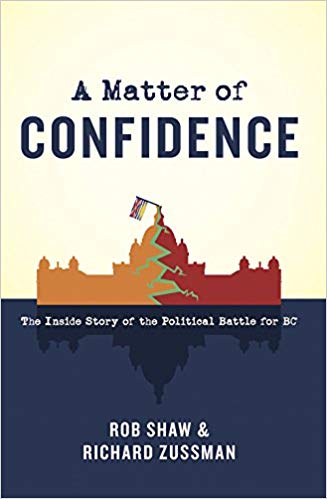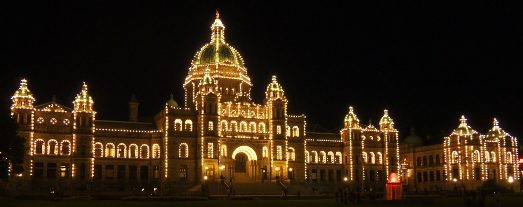
Reflections on Vancouver, British Columbia and other topics, related or not
A matter of
overconfidence
Two B.C. journalists write a book
Greg Klein | June 19, 2018
A Matter of Confidence: The Inside Story of the Political Battle for BC
by Rob Shaw and Richard Zussman
The British Columbia legislature:
Bright lights on the outside belie a dim-witted interior.
Rob Shaw covers the legislature for the Vancouver Sun while Richard Zussman does the same for some TV station, so this book’s fucked for starters. But it does demonstrate how most B.C. journalists buy into the province’s political culture to the extent that they can’t take a detached perspective. They’re very much part of that culture themselves, and would probably be flattered to hear that said.
But it’s a culture of stupidity. That was especially so under Christy Clark’s premiership. Don’t tell that to Shaw and Zussman, though. To them, she was “the whip-smart premier with a highly developed political antenna.” They laud her for “the important things she had to say, on governing, policy, and the province” without, of course, providing examples. There weren’t any.
The authors also push the notion that Clark’s colleagues were capable: “What’s the point, she would say, of putting smart people into cabinet if you aren’t willing to listen to them and let them do their job?” Smart people? A few in Gordon Campbell’s senior cabinet, maybe, and at least one in the NDP’s current crew. None in hers.
While the authors fail to recognize their little world’s rampant stupidity, they do mention disapproval of Clark from BC Liberal MLA Moira Stilwell, a radiologist and nuclear medicine physician. What must she have thought about dolts like Mike de Jong, Rich Coleman, Shirley Bond and Suzanne Anton—the most senior ministers—not to mention Speaker of the Legislature and borderline retard Linda Reid?

We’re not told. Presumably Shaw and Zussman consider them “whip-smart” too.
The shit level of insight shows again as the authors misinterpret this strategy from the 2017 NDP campaign, when candidates were told to stop criticizing Clark’s obvious delight in photo-ops:
References to Clark as a “cheerleader” for projects like LNG needed to be dampened too. Other phrasings had also crept into the speeches in the legislature from NDP MLAs, such as calling Clark’s throne speech “a bunch of fluff” and saying that her LNG promises were similar to “unicorns and butterflies and flowers and fairies.” It wasn’t, perhaps, overtly sexist language. At least not yet. But it was clearly headed down a path toward something worse, until the NDP altered course.”
Those remarks, some borrowed from Stephen Harper’s frustration with Trudeau II, commented fairly on Clark’s superficiality. They’re considered dangerous only because conventional discourse accepts this PC tactic of shielding women from justified criticism. (That probably explains why Campbell threw at least one TV debate with indisputable idiot Carole James.)
The authors understate the grasping ambition of politicians, although we do hear that both the Quick Wins whistleblower and BC Liberal turncoat Darryl Plecas resented being passed over for promotion. The book also notes that, after the precarious 2017 election results, some BC Libs opposed a sudden rematch because they hadn’t put in the six years necessary to qualify for gold-plated pensions.
Shaw and Zussman do an adequate job of outlining Clark’s transformation from LNG ignoramus to cheerleader proselyte, even conceding that “when Clark assumed her premiership in 2011, neither she nor her top officials had any clue what LNG was or why it was important.” But for the most part readers get the sub-mediocre reporting and commentary that’s typical of B.C. media.
That includes considerable attention to an insignificant Main Streeting incident in which a woman tells Clark she won’t vote for her. The woman did nothing impressive and Clark did nothing wrong. Why do the authors suggest otherwise? Probably because the rest of the media did. That was a false portrayal, and in Shaw and Zussman it shows the media’s herd mentality.
Indifferent writers, weak on grammar as well as insight, these guys also seem oblivious to the ridiculous, for example when they write that James “said she was throwing her full weight behind [John Horgan’s] candidacy.” He’s lucky she didn’t flatten him.
As the 2017 campaign continued, the decades-old problem of housing prices gained so much momentum that even the BC Liberals—wow!—recognized its importance. Shaw and Zussman relate Clark’s frustration with de Jong and others who couldn’t (or wouldn’t?) come up with an effective policy. But the authors don’t ask why the “whip-smart” politician didn’t take charge of the issue herself, or at least show stronger leadership in demanding results.
Possibilities include the Chinese vote, campaign contributions, outright bribes or just sheer incompetence. As at least some aspects of the province’s money-laundering scandal come to light under the ethically limited but reasonably intelligent David Eby, we might someday learn why this problem was allowed to take on crisis proportions.
If so, it’ll be no thanks to guys like Shaw and Zussman. The fact that an inept mob like Clark and her cohorts could pretend to run a place like B.C. speaks volumes about the province’s overall superficiality. That’s generally characteristic of the media too, including the obviously inadequate Shaw-Zussman team. This book shows they’re very much part of the stupid little world they write about.
